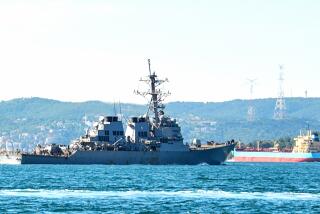Now, Something Worse in the Gulf Than War : What if You Do Everything Right and End Up Killing 300 Civilians?
- Share via
I heard of the latest Persian Gulf incident from National Public Radio while driving home from Nashville, Tenn. The collective deaths of even 300 terrorists would give most of us cause for momentary grief at the wastage of human life. The extinction of a similar number of civilian lives, many of them children’s lives, is a horror differing from the Holocaust in scale but not in substance. And we all ask ourselves in that moment when our eyes close and breath goes out in a sigh, “What went wrong?”
What went wrong is simply that there is a war under way in and around the Persian Gulf. The world has evolved rules for the conduct of war, and though it may seem that the very concept of rules for the dreadful thing that we call war is lunacy, we have here an example of why they did in fact come about--there are worse things than war.
The U.S. Navy is in the gulf for a reason so simple as to be irrelevant in these modern, sophisticated times. It’s called freedom of the seas. That was the first mission of the U.S. Navy after independence. A flag officer named Preble led a small fleet of warships to the Mediterranean to restrain the Barbary pirates from attacking American shipping. Later the U.S. Navy and the Royal Navy exterminated piracy in U.S. waters and ruthlessly enforced a ban on the slave trade. This was done because the collective will of mankind wishes the sea to be free for the passage of all and the pursuit of peaceful trade.
In time of war things are more complicated. It is customary for belligerent nations to deny maritime trade to one another, extending even to ships of non-belligerent nations. In 1914 it came about that merchant ships were subjected to submarine attack without warning, ending the longstanding “Rules of Prize Warfare” that had made the interdiction of trade a fairly civilized process. Western nations were horrified by this development, but soon realized that technology made it inevitable.
In the Iran-Iraq War something new has been added. Iraq has attacked Iranian and otherwise-flagged tankers taking oil out . Both sides, of course, are selling oil, and are using the proceeds to buy weapons used in a war that may have ended a million lives for a few square miles of marshland on their mutual border. As terrible as that is, it isn’t new. Neither is the extensive use of chemical weapons, a special horror largely ignored in the rest of the world. What is new are Iranian attacks against tankers of non-belligerent nations trading with other gulf states, and occasionally against those states as well. This is donein the belief that those other states are providing financial support to Iraq as a foil against the Islamic revolution in Iran, which may well be true. While Iran is unwilling to declare war against its neighbors, it seems to want to share with them the misery and costs of that war.
And that is why the U.S. Navy is in the Persian Gulf. The duty of sustaining the principle of freedom of the seas historically falls on the nation with the most powerful navy, and that’s us. Unfortunately, we have handled the matter poorly.
We extended our protection only to American-flagged Kuwaiti tankers as if freedom of the seas were a superpower prerogative, even though we have entered wars to prove that it was not. Historians tell us that departure from principle in the name of expediency is always a mistake. For those who don’t believe, here is renewed proof. The principle was not observed in full, and the Iranians gave it commensurate respect. Move and countermove have ensued. American sailors have died because we have ordered them to be a “presence” in a war zone. Our ships must live in a war zone, must defend themselves but may not take any decisive action to end the threats. When attacked, they take enough action to punish the attackers, but not those who gave the orders. This in a part of the world where human life is rather a cheaper currency than it is here. And so it goes on.
And so while the Vincennes was fighting yet another small engagement against Iranian gunboats, a new blip appeared on its radar screens. The aircraft was reportedly not in a designated airliner corridor.
Put yourself in the captain’s place. U.S. ships have been attacked by aircraft in the gulf, at the cost of American lives. You have one battle under way, and now there is a new potential threat. It’s heading toward you at 450 knots. Not so long ago, another U.S. Navy cruiser shot it out with air and surface units at the same time. You try to warn the aircraft off. Your radar doesn’t tell you what kind of aircraft it is because radar sets don’t do that. If it’s an airliner, you think, it ought to have its transponder on--but military aircraft can and have used airliner codes on their transponder boxes. Maybe the transponder was broken. Maybe it was switched off. A fighter-bomber can go faster than 450 knots, but that’s about the right speed for a bomb or missile attack. You call him on a different frequency to warn him off. He’s heading right toward you, and 450 knots means that he’s closing the range on your ship at a rate of almost 9 miles per minute. Your lookouts are searching for him with their “big eye” spotting glasses, but they can’t see him in the clouds and haze. Who is it? You’re still calling him on the radio when it occurs to you that he’s closer to you than the plane that put two Exocet missiles into the Stark.
What would you do now? You’d probably remember that the prime duty of a ship’s captain is the safety of his ship. The captain of the Vincennes waited long enough that he fired two missiles at a range of nine miles, when those missiles can reach at least five times that distance. Probably you’re still hoping to raise him. If you do, you can shut off the guidance radar and the missiles will self-destruct. But he doesn’t answer, and the SM2MR missiles performed as designed. Then you find out that it’s an airliner. You did everything right, and killed 300 civilians.
It is an overly respected Western tradition that when politicians can’t decide what to do, people in uniform are sent to the troublesome spots to do the dying, and the killing. People in uniform don’t ask very much of us, despite the fact that we ask a lot of them. What they deserve are clear orders and clear missions, but that doesn’t happen very much. Because it didn’t happen here, something worse than war did happen.
I wonder if Capt. Will C. Rogers III will have a decent night’s sleep anytime soon. You see, he is a victim, too.
More to Read
Sign up for Essential California
The most important California stories and recommendations in your inbox every morning.
You may occasionally receive promotional content from the Los Angeles Times.













